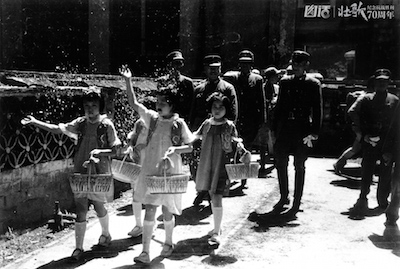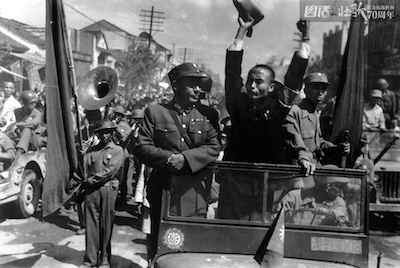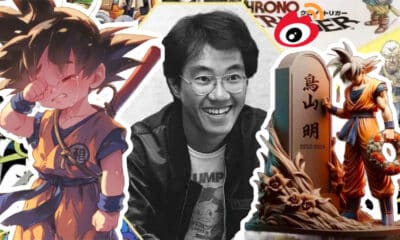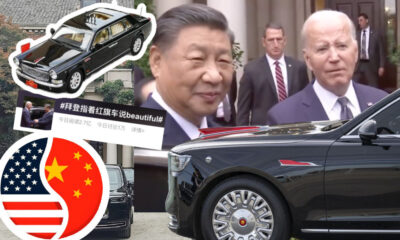Weiblog
Chinese Government Declares New National Holiday
The year 2015 has a special meaning for Chinese People, as it has been 70 years since the end of the war. The Chinese Government Declares New National Holiday.
Published
9 years agoon
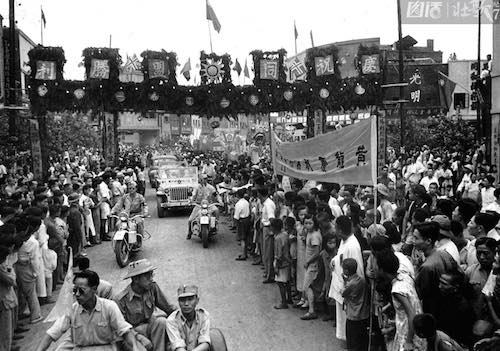
The year 2015 has a special meaning for Chinese People, as it has been 70 years since the end of the war.
The Chinese government has therefore declared a new national holiday on September 3th this year, commemorating the 70th Anniversary of the end of the Second Sino-Japanese War, that merged into WWII when China joined the Allies in 1941. This war, that is also called the Chinese People’s War of Resistance against Japan (中国人民抗日战争), ended in September 1945.
September 3th has been made into a holiday for the public to participate in the commemorations held by the central government and those organized by local departments in different cities around China. It follows directly after Victory over Japan Day on September 2.
According to the new schedule, Thursday, September 3th, will be observed as a national holiday, followed by two more days of vacation on Friday, September 4, and Saturday, September 5. Sunday, September 6, will be a make-up work day.
The State Council of China has pointed out that departments working in duty, security and safeguarding fields must be arranged well by in all places; they must prepare for unexpected big incidents, and proper measures must be taken to ensure all commemorations across the nation can be held smoothly.
The topic became trending on Sina Weibo (#9月3日全国放假#), with many netizens expressing their support for the commemoration and their joy with an extra free day. For some netizens, however, one day of commemoration is not enough: “I think that one day of commemoration is not enough to express our joy with the victory of war (..),” one netizens says*: “Aren’t August 15th [Japan’s surrender to the Allies in 1945] and September 18th [the Mukden Incident] also important dates? Won’t we commemorate them? I think we should have a holiday from August 15 until September 18, then we can really enjoy the happiness of peace..”
Tencent News published some historical pictures from the end of the war in 1945 China in the light of the news of the national commemorations this year.

Chinese crowds celebrating surrender of Japan on Victory over Japan Day in Chongqing (Photo by Jack Wilkes, Getty Images).
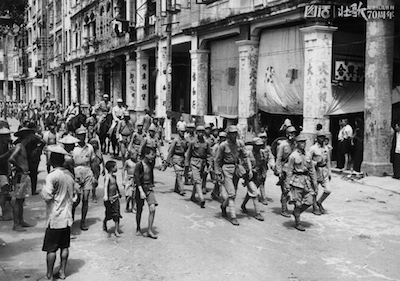
The celebrations of the end of the Second World War did not last long everywhere, as the nation erupted in civil war. On this picture, you can see the army troops entering Guangzhou after the Japanese have left.
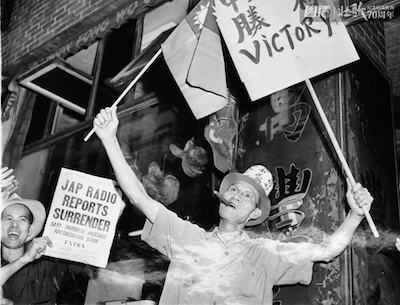
Chinese Americans on Mott and Pell Streets in New York’s Chinatown celebrate after learning that the Japanese have surrendered to the Allies, on Victory over Japan Day, Aug. 14, 1945 (AP Photo/Tom Fitzsimmons).
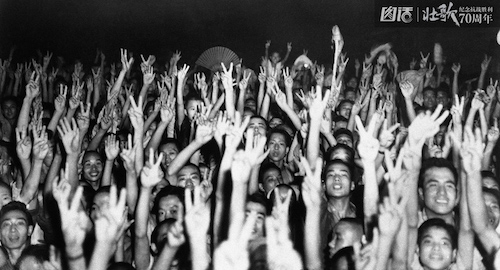
Crowds of joyous Chinese make a sea of hands as they wave their during Chongqing victory celebrations, after receiving the news that the Japanese in Chongqing surrendered (August 29, 1945). Many of them can be seen making the V- sign (AP Photo).

Celebrations in Shanghai: teahouses gave out free tea, merchants gave out free flags to celebrate the Japanese surrender (Photo by Fox Photos/Getty Images).
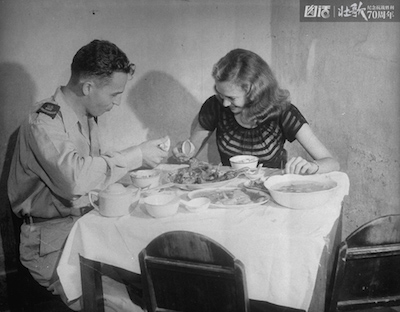
War correspondent Palmer Hoyt and his girlfriend Barbara Stephens, celebrating in Chongqing, October 1945. (Photo by Jack Wilkes/Getty Images)

Chinese crowds celebrate Victory over Japan Day in 1945, with some performing the Dragon Dance. (Photo by Jack Wilkes/Getty Images).
Featured Image:
Parade in Chongqing, Celebrations in China of Victory over Japan Day September 3, 1945: http://news.qq.com/original/tuhua/shengliri.html
*”我觉得吧,九月三日胜利纪念日当天放假并不足以表达我们对胜利的喜悦,以及对和平的祈愿,日本也很慢再着短短一天里吸取什么教训。而八月十五日和九月十八日难道不也是重要的日子吗?难道就不去铭记了?所以应该从八月十五日放到九月十八日,让我们在这一个月里好好感受和平的幸福与来之不易不更好吗~”
[box] This is Weiblog: the What’s on Weibo short-blog section. Brief daily updates on our blog and what is currently trending on China’s biggest social medium, Sina Weibo.[/box]
©2015 Whatsonweibo. All rights reserved. Do not reproduce our content without permission – you can contact us at info@whatsonweibo.com.
Manya Koetse is the founder and editor-in-chief of whatsonweibo.com. She is a writer, public speaker, and researcher (Sinologist, MPhil) on social trends, digital developments, and new media in an ever-changing China, with a focus on Chinese society, pop culture, and gender issues. She shares her love for hotpot on hotpotambassador.com. Contact at manya@whatsonweibo.com, or follow on Twitter.

Also Read
China Memes & Viral
Chengdu Disney: The Quirkiest Hotspot in China
How a senior activity park in Chengdu was ‘Disneyfied’ and became a viral hotspot.
Published
5 days agoon
April 12, 2024
How did a common park turn into a buzzing hotspot? By mixing online trends with real-life fun, blending foreign styles with local charm, and adding a dash of humor and absurdity, Chengdu now boasts its very own ‘Chengdu Disney’. We explain the trend.
– By Manya Koetse, co-authored by Ruixin Zhang
Have you heard about Chengdu Disney yet? If not, it’s probably unlike anything you’d imagine. It’s not actually a Disney theme park opening up in Chengdu, but it’s one of the city’s most viral hotspots these days.
What is now known as ‘Chengdu Disney’ all over the Chinese internet is actually a small outdoor park in a residential area in Chengdu’s Yulin area, which also serves as the local senior fitness activity center.
Crowds of young people are coming to this area to take photos and videos, hang out, sing songs, cosplay, and be part of China’s internet culture in an offline setting.
Once Upon a Rap Talent Show
The roots of ‘Chengdu Disney’ can be traced back to the Chinese hip-hop talent show The Rap of China (中国新说唱), where a performer named Nuomi (诺米), also known as Lodmemo, was eliminated by Chinese rapper Boss Shady (谢帝 Xièdì), one of the judges on the show.
Nuomi felt upset about the elimination and a comment made by his idol mentor, who mistakenly referred to a song Nuomi made for his ‘grandma’ instead of his grandfather. His frustration led to a viral livestream where he expressed his anger towards his participation in The Rap of China and Boss Shady.
However, it wasn’t only his anger that caught attention; it was his exaggerated way of speaking and mannerisms. Nuomi, with his Sichuan accent, repeatedly inserted English phrases like “y’know what I’m saying” and gestured as if throwing punches.
His oversized silver chain, sagging pants, and urban streetwear only reinforce the idea that Nuomi is trying a bit too hard to emulate the fashion style of American rappers from the early 2000s, complete with swagger and street credibility.

Lodmemo emulates the style of American rappers in the early 2000s, and he has made it his brand.
Although people mocked him for his wannabe ‘gangsta’ style, Nuomi embraced the teasing and turned it into an opportunity for fame.
He decided to create a diss track titled Xiè Tiān Xièdì 谢天谢帝, “Thank Heaven, Thank Emperor,” a word joke on Boss Shady’s name, which sounds like “Shady” but literally means ‘Thank the Emperor’ in Chinese. A diss track is a hip hop or rap song intended to mock someone else, usually a fellow musician.
In the song, when Nuomi disses Boss Shady (谢帝 Xièdì), he raps in Sichuan accent: “Xièdì Xièdì wǒ yào diss nǐ [谢帝谢帝我要diss你].” The last two words, namely “diss nǐ” actually means “to diss you” but sounds exactly like the Chinese word for ‘Disney’: Díshìní (迪士尼). This was soon picked up by netizens, who found humor in the similarity; it sounded as if the ‘tough’ rapper Nuomi was singing about wanting to go to Disney.

Nuomi and his diss track, from the music video.
Nuomi filmed the music video for this diss track at a senior activity park in Chengdu’s Yulin subdistrict. The music video went viral in late March, and led to the park being nicknamed the ‘Chengdu Disney.’
The particular exercise machine on which Nuomi performed his rap quickly became an iconic landmark on Douyin, as everyone eagerly sought to visit, sit on the same see-saw-style exercise machine, and repeat the phrase, mimicking the viral video.

What began as a homonym led to people ‘Disneyfying’ the park itself, with crowds of visitors flocking to the park, some dressed in Disney-related costumes.

This further developed the concept of a Chengdu ‘Disney’ destination, turning the park playground into the happiest place in Yulin.
Chengdu: China’s Most Relaxed Hip Hop Hotspot
Chengdu holds a special place in China’s underground hip-hop scene, thanks to its vibrant music culture and the presence of many renowned Chinese hip-hop artists who incorporate the Sichuan dialect into their songs and raps.
This is one reason why this ‘Disney’ meme happened in Chengdu and not in any other Chinese city. But beyond its musical significance, the playful spirit of the meme also aligns with Chengdu’s reputation for being an incredibly laid-back city.
In recent years, the pursuit of a certain “relaxed feeling” (sōngchígǎn 松弛感) has gained popularity across the Chinese internet. Sōngchígǎn is a combination of the word for “relaxed,” “loose” or “lax” (松弛) and the word for “feeling” (感). Initially used to describe a particular female aesthetic, the term evolved to represent a lifestyle where individuals strive to maintain a relaxed demeanor, especially in the face of stressful situations.
🌟 Attention!
For 11 years, What’s on Weibo has remained a 100% independent blog, fueled by my passion to write about China’s digital culture and online trends. Over a year ago, we introduced a soft paywall to ensure the sustainability of this platform. I’m grateful to all our loyal readers who’ve subscribed since 2022. Your support has been invaluable. But we need more subscribers to continue our work. If you appreciate our content and want to support independent China reporting, please consider becoming a subscriber. Your support keeps What’s on Weibo going strong!
The concept gained traction online in mid-2022 when a Weibo user shared a story of a family remaining composed when their travel plans were unexpectedly disrupted due to passport issues. Their calm and collected response inspired the adoption of the “relaxed feeling” term (also read here).
Central to embodying this sense of relaxation is being unfazed by others’ opinions and avoiding unnecessary stress or haste out of fear of judgment.
Nowadays, Chinese cities aim to foster this sense of sōngchígǎn. Not too long ago, there were many hot topics suggesting that Chengdu is the most sōngchí 松弛, the most relaxed city in China.
This sentiment is reflected in the ‘Chengdu Disney’ trend, which both pokes fun at a certain hip-hop aesthetic deemed overly relaxed—like the guys who showed up with sagging pants—and embraces a carefree, childlike silliness that resonates with the city’s character and its people.

Mocking sagging pants at ‘Chengdu Disney.’
Despite the influx of visitors to the Chengdu Disney area, authorities have not yet significantly intervened. Community notices urging respect for nearby residents and the presence of police officers to maintain order indicate a relatively hands-off approach. For now, it seems most people are simply enjoying the relaxed atmosphere.
Being Part of the Meme
An important aspect that contributes to the appeal of Chengdu Disney is its nature as an online meme, allowing people to actively participate in it.

Scenes from Chengdu Disney, images via Weibo.
China has a very strong meme culture. Although there are all kinds of memes, from visual to verbal, many Chinese memes incorporate wordplay. In part, this has to do with the nature of Chinese language, as it offers various opportunities for puns, homophones, and linguistic creativity thanks to its tones and characters.
The use of homophones on Chinese social media is as old as Chinese social media itself. One of the most famous examples is the phrase ‘cǎo ní mǎ’ (草泥马), which literally means ‘grass mud horse’, but is pronounced in the same way as the vulgar “f*ck your mother” (which is written with three different characters).
In the case of the Chengdu Disney trend, it combines a verbal meme—stemming from the ‘diss nǐ’ / Díshìní homophone—and a visual meme, where people gather to pose for videos/photos in the same location, repeating the same phrase.
Moreover, the trend bridges the gap between the online and offline worlds, as people come together at the Chengdu playground, forming a tangible community through digital culture.
The fact that this is happening at a residential exercise park for the elderly adds to the humor: it’s a Chengdu take on what “urban” truly means. These colorful exercise machines are a common sight in Chinese parks nationwide and are actually very mundane. Transforming something so normal into something extraordinary is part of the meme.

A 3D-printed model version of the exercise equipment featured in Nuomi’s music video.
Lastly, the incorporation of the Disney element adds a touch of whimsy to the trend. By introducing characters like Snow White and Mickey Mouse, the trend blends American influences (hip-hop, Disney) with local Chengdu culture, creating a captivating and absurd backdrop for a viral phenomenon.
For some people, the pace in which these trends develop is just too quick. On Weibo, one popular tourism blogger (@吴必虎) wrote: “The viral hotspots are truly unpredictable these days. We’re still seeing buzz around the spicy hot pot in Gansu’s Tianshui, meanwhile, a small seesaw originally meant for the elderly in a residential community suddenly turns into “Chengdu Disneyland,” catching the cultural and tourism authorities of Sichuan and even Shanghai Disneyland off guard. Netizens are truly powerful, even making it difficult for me, as a professional cultural tourism researcher, to keep up with them.”
By Manya Koetse, co-authored by Ruixin Zhang
Independently reporting China trends for over a decade. Like what we do? Support us and get the story behind the hashtag by subscribing:
Spotted a mistake or want to add something? Please let us know in comments below or email us. First-time commenters, please be patient – we will have to manually approve your comment before it appears.
©2024 Whatsonweibo. All rights reserved. Do not reproduce our content without permission – you can contact us at info@whatsonweibo.com.
China Food & Drinks
Where to Eat and Drink in Beijing: Yellen’s Picks
From Yunnan classics to fusion cuisine, these are Janet Yellen’s picks for dining and drinking in Beijing.
Published
6 days agoon
April 11, 2024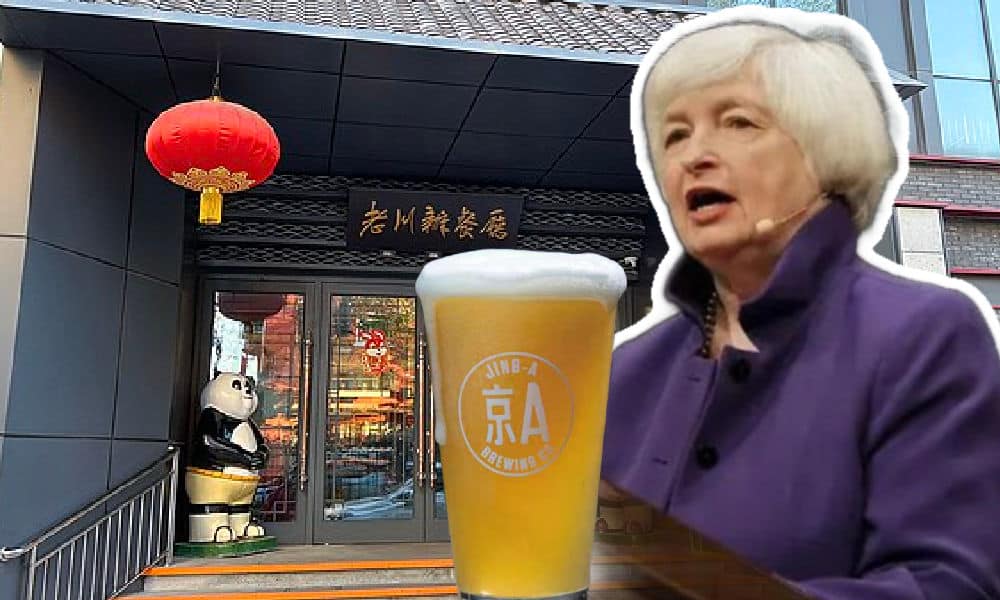
Janet Yellen, the United States Secretary of the Treasury, seems to have some excellent advisors, at least when it comes to choosing spots for food and drinks in Beijing.
Yellen just concluded her second trip to Beijing within a year, and once again, it’s not her official talks but rather her choices in food and drink venues that are sparking discussion on social media.
Her initial visit to Beijing was in July 2023, during which she held meetings with Chinese Premier Li Qiang and other officials.
This time, from April 4th to 9th, Yellen’s agenda included engagements with top Chinese officials in both Guangzhou and Beijing. The primary focus was on addressing ongoing bilateral tensions and managing trade relations between the US and China. In addition to official meetings, Yellen also met up with students and business leaders.
Yellen’s selection of bars and restaurants drew interest online. Yellen is known to be a food enthusiast, and likes to visit local restaurants wherever she goes.
In Guangzhou, Yellen dined at Taotaoju (陶陶居), a renowned Cantonese restaurant where she had roast goose and shrimp dumplings.
If you’re curious about the places she visited in Beijing during her first and second trip, check out our short ‘Yellen’s Beijing’ list below.
‘In & Out’ Yunnan Restaurant
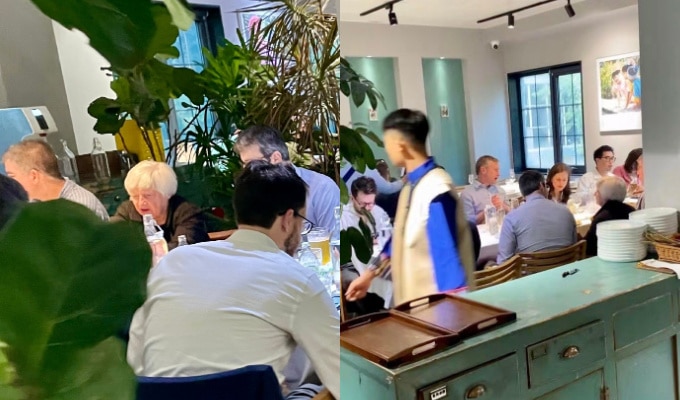
Yellen at Yizuo Yiwang, photos via Weibo.
● Name: ‘In and Out’ in English, Chinese name: Yī Zuò Yī Wàng 一坐一忘
● Specialty: Yunnan cuisine
● Notable: Yellen visited this local favorite near Beijing’s embassy area in the summer of 2023. Among other things, Yellen was served spicy potatoes with mint and stir-fried mushrooms, leading to online jokes about how the food would affect her. The mushroom dish that she had is called jiànshǒuqīng (见手青), which literally means “see hand blue”, in reference to turning blue when handled. It is the lanmaoa asiatica mushroom species that grows in China’s Yunnan region known for its hallucinogenic properties (when treated and cooked properly, they don’t cause hallucinations read more here). After Yellen’s visit, ‘In & Out’ used it as part of their marketing strategy and the restaurant released a special ‘Treasury Menu’ (or ‘God of Wealth’ Menu 财神菜单), promoting themselves as the first place where Yellen had dinner during her Beijing visit.
● Price: Dishes range from 38 yuan ($5) to 298 yuan ($41)
● Address: Chaoyang, Sanlitun Beixiaojie 1 / 朝阳区三里屯北小街1号
Grand Hyatt’s ‘Made in China’
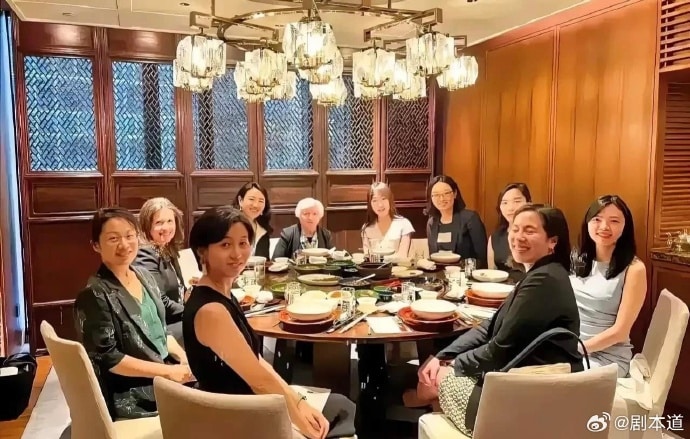
Yellen’s lunch at the Grand Hatt, image via Weibo.
● Name: ‘Made in China’ in English, Chinese name: Cháng’ān Yī Hào 长安壹号餐厅
● Specialty: Northern Chinese cuisine, including Peking duck / Fusion
● Notable: This is the venue where Yellen had lunch with a group of female economists and entrepreneurs in July of 2023 (you can see the speech she gave during lunch here). She apparently likes this restaurant a lot, since she visited it again for dinner on April 8 of this year. For her 2023 lunch, we know that Yellen ordered steamed fish head with chopped pepper (剁椒鱼头). The famous Hunan dish was among the most expensive dishes on a special menu (850 yuan/$117) for Yellen’s visit at the time. This time around, she also had Peking Duck. The award-winning Made in China restaurant, which is simply called “Chang’an no 1” in Chinese (after its address, 长安壹号餐厅), has been around for two decades, and the Beijing head chef Jin Qiang has been there from the start – he has since welcomed numerous heads of state and government leaders from around the world.
● Price: Appetizers start from 58 yuan ($8), seafood dishes around 500 yuan (69 yuan), Peking Duck 388 yuan ($53)
● Address: Grand Hyatt, Dongcheng, 1 East Chang’An Avenue / 东长安街1号东方广场
Lao Chuan Ban
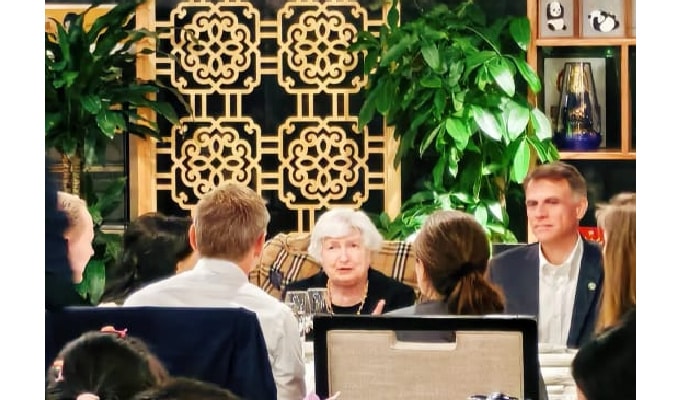
Yellen at Chuan Ban, image via Dianping.
● Name: Chuan Ban, Chinese name: 川办餐厅 aka ‘Lao Chuan Ban’ (Old Chuan Ban 老川办)
● Specialty: Sichuan food
● Notable: Chuan Ban, established as part of the Sichuan provincial government office and open to the public since 1995, is renowned for its authentic Sichuan cuisine. During her visit to Beijing, Yellen and her group dined at this famous restaurant on April 6 this year. They enjoyed a variety of dishes including Mapo tofu (麻婆豆腐), Sichuan-style cold noodles (四川凉面), clear noodles in chili sauce (川北凉粉), smashed cucumber salad (拍黃瓜), and Zhong dumpings in spicy sauce (钟水饺).
● Price:Dumplings for 18 yuan ($2.5), beef noodles for 16 yuan ($2.2), salt and pepper shrimp for 46 yuan ($6.3), fried lamb chops for 188 yuan ($26) – there’s something for everyone in different price ranges.
● Address: Dongcheng, 5 Gongyuan Toutiao, Jianguomennei Dajie / 东城区建国门内贡院头条5号
Jing-A Brewery
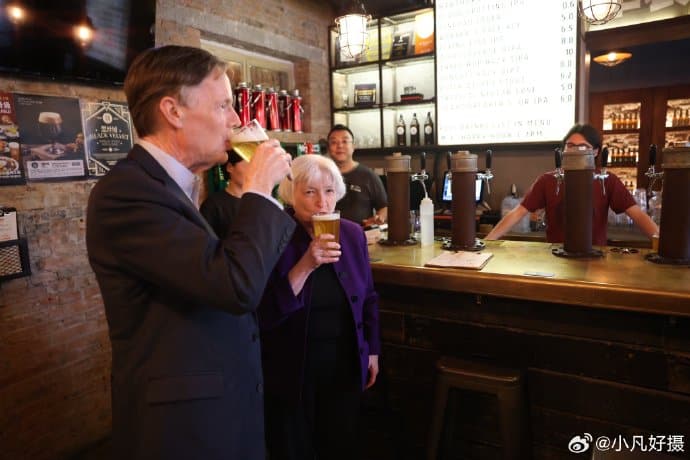
Yellen having a beer, image via Weibo.
● Name: Jing-A Brewery, Chinese name: 京A
● Specialty: Craft beer
● Notable: After five days of meetings during her 2024 China visit, Janet Yellen enjoyed a beer together with US ambassador Nicholas Burns at Jing-A, a brewery founded by wo Beijing-based American friends in 2012. In one of her tweets, Yellen explained that the microbrewery imports American hops for their beers — “a small representation of how the U.S.-China bilateral economic relationship can benefit both sides” (link).
● Price:Beers starting at 35 yuan ($4.8), snack dishes starting at 58 yuan ($8)
● Address: Jing-A Brewpub Xingfucun, Chaoyang, 57 Xingfucun Zhong Lu, Chaoyang, Beijing / 朝阳区幸福村中路57号
By Manya Koetse
Independently reporting China trends for over a decade. Like what we do? Support us and get the story behind the hashtag by subscribing:
Spotted a mistake or want to add something? Please let us know in comments below or email us. First-time commenters, please be patient – we will have to manually approve your comment before it appears.
©2024 Whatsonweibo. All rights reserved. Do not reproduce our content without permission – you can contact us at info@whatsonweibo.com.
Subscribe

Chengdu Disney: The Quirkiest Hotspot in China

Where to Eat and Drink in Beijing: Yellen’s Picks

Weibo Watch: Burning BMWs

More than Malatang: Tianshui’s Recipe for Success

The Chinese Viral TikTok Song Explained (No, It’s Not About Samsung)

The ‘Two Sessions’ Suggestions: Six Proposals Raising Online Discussions

A Snowball Effect: How Cold Harbin Became the Hottest Place in China

Jia Ling Returns to the Limelight with New “YOLO” Movie and 110-Pound Weight Loss Announcement

Top 9 Chinese Movies to Watch This Spring Festival Holiday

Party Slogan, Weibo Hashtag: “The Next China Will Still Be China”

From Pitch to Politics: About the Messy Messi Affair in Hong Kong (Updated)

Weibo Watch: Frogs in Wells

Looking Back on the 2024 CMG Spring Festival Gala: Highs, Lows, and Noteworthy Moments

Two Years After MU5735 Crash: New Report Finds “Nothing Abnormal” Surrounding Deadly Nose Dive

More than Malatang: Tianshui’s Recipe for Success
Get in touch
Would you like to become a contributor, or do you have any tips or suggestions? Get in touch here!
Popular Reads
-

 China Insight1 month ago
China Insight1 month agoThe ‘Two Sessions’ Suggestions: Six Proposals Raising Online Discussions
-

 China Insight3 months ago
China Insight3 months agoA Snowball Effect: How Cold Harbin Became the Hottest Place in China
-

 China Arts & Entertainment3 months ago
China Arts & Entertainment3 months agoJia Ling Returns to the Limelight with New “YOLO” Movie and 110-Pound Weight Loss Announcement
-

 China Arts & Entertainment2 months ago
China Arts & Entertainment2 months agoTop 9 Chinese Movies to Watch This Spring Festival Holiday

